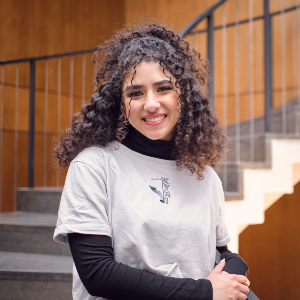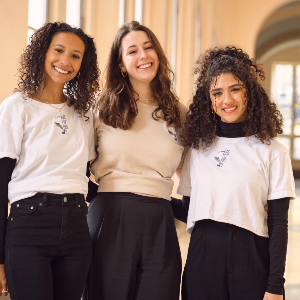“A pocket guide to rights and duties”
12 May 2023
Law student Natali Gbele has set up an association that shows refugees their rights.
12 May 2023
Law student Natali Gbele has set up an association that shows refugees their rights.

LMU student Natali Gbele also trains volunteers. | © LC Productions
Can the police ask to see my ID at the station? What are my rights if they do? And what rights do the police have? Natali Gbele devotes a lot of energy to examining such questions – and finding ways to communicate the answers in a way that is easy to understand. “I think there are probably many Germans too who don’t know how to behave when faced with a public identity check,” the 24-year-old says. “But on top of the nerves, refugees also have to deal with the language barrier. And a lot is at stake for them.”
Studying law in her tenth semester at LMU, Gbele is currently preparing for her forthcoming state examination. In her apartment, information leaflets in ten different languages are piled up alongside law books. Why? Because over a year ago, she and some of her fellow students founded Know Your Rights Initiative e.V. (KYRI). “Our aim,” she explains, “is to make it easier for refugees and non-nationals to understand their rights in Germany.”
Gbele is a Palestinian who “has never had to flee her home, fortunately”. However, when she came to Germany alone in 2017, she did not speak a word of German. “So, I know how hard it is to become integrated in a foreign culture and society with that kind of language barrier.” A year later, making rapid progress with the language and applying for a residence permit in order to study law, she still felt “completely overwhelmed” by all the legalese – and by her dealings with the authorities in general.
All too often, I found people coming for advice when it was simply too late – because they didn’t understand the meaning of complicated German compound words such as ‘time limits for raising objections’ or ‘instructions on legal aid’ in legal documents. But as soon as such a time limit has elapsed, there is little you can do to help in legal terms.Natali Gbele
To help other foreign nationals with similar issues, she initially signed up to the Refugee Law Clinic Munich, a student association that advises refugees on rights of residence and asylum law. “All too often, I found people coming for advice when it was simply too late – because they didn’t understand the meaning of complicated German compound words such as ‘time limits for raising objections’ or ‘instructions on legal aid’ in legal documents. But as soon as such a time limit has elapsed, there is little you can do to help in legal terms.” It was this experience that gave her the idea for KYRI: providing preventive advice before situations escalate.
The realization that preventive advice had to be made available in a readily accessible and written form that was easy to understand came when Gbele traveled to London. “I was visiting a friend there and went with him to a demonstration.” Volunteers were handing out little yellow cards to the demonstrators. “On the one side there were numbers to call if the police arrested you. And on the other were hints on what you can and can’t do when being questioned by police in Great Britain,” the law student recalls. “The cards were effectively pocket guides to rights and duties: very compact, but potentially life changing.” The idea of disseminating written information in plain and simple language grew out of this encounter: “You don’t want to have to google legal terms on the move.”

Natali Gbele with two comrades-in-arms. Kyri now has 23 members and networks with other non-profit organizations. | © LC Productions
Gbele and six fellow students set up KYRI in 2021. “That was the minimum number needed for a registered association,” she says. “That is something else I learned in the process.” Six of them were studying law, one of them communication science. Today, KYRI has 23 members. Its first project was to hold the fall lecture series “Law Explained” at Bellevue di Monaco, a residential facility and cultural center for refugees in Munich’s Glockenbach quarter.
“The most effective way of getting our information to the right people is to work together with social institutions,” Gbele explains. The subject of the lectures delivered at Bellevue di Monaco was police checks: public searches and identity checks, public gatherings and apartment searches. “There is a practice known colloquially as ‘station searches’, where the police conduct checks in public.” Gbele says. “But what happens to refugees who don’t have their temporary residence permit with them? What can the police do in such cases? Can they search the person’s belongings, for example? Are refugees allowed to refuse such searches?”
Clearly, these are also situations that can affect Germans as well: It is no coincidence that locals also attended the KYRI lectures, alongside refugees and international students. “But for non-nationals and refugees, there is often so much more at stake.” Inappropriate responses can have serious consequences and even cost them their residence permit, for example.
For each lecture, the team put together handouts in English, French, German, Spanish, Arabic, Russian, Ukrainian, Croatian, Farsi and Dari. Some of the material is still being translated. “But we are getting support from the volunteer translators at the Translaid charity,” Gbele adds. There was also a lot of help from the ranks of LMU. Lecturers in law reviewed the leaflets and even delivered lectures themselves. One lecturer organized a didactics workshop on plain language in law for the KYRI members. “Without such tremendous support from LMU," says Gbele, who herself sidelines as a student assistant at the Chair of Public International Law and Public Law, “our work would not be where it is today.”
Alongside its cooperative ventures with Bellevue di Monaco, KYRI is currently planning projects with the Munich Refugee Council, the Kreisjugendring (district youth association) and the Condrobs association, which works with young people who have a migration background, for example. Recently, KYRI also began offering advanced training to volunteer advisors. “That is because very few social institutions have their own legal professionals,” Gbele explains. "This is an unfilled niche in the market, so to speak.” On behalf of the Munich Refugee Council, for example, KYRI now runs courses on criminal law for foreign nationals, police law and safety/security law. It is also drafting a manual that will let advisers look up legal interrelationships on the fly. As Gbele puts it: “It can be so useful to have the right clauses and paragraphs at your fingertips.”
Kyri: Know Your Rights Initiative
Student initiative: Refugee Law Clinic Munich
Cultural center: Bellevue di Monaco